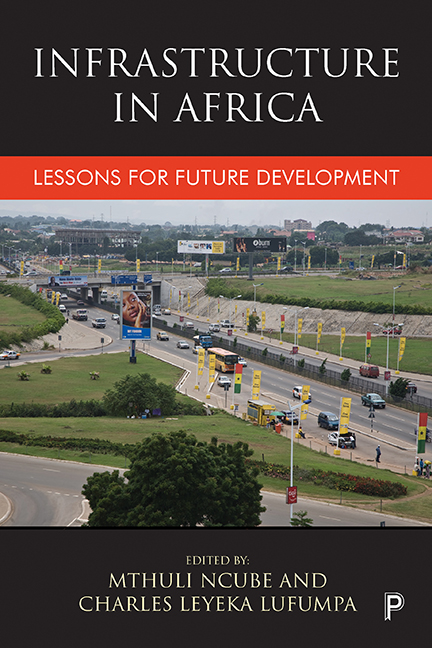Book contents
- Frontmatter
- Contents
- List of figures
- List of tables
- List of boxes
- Notes on contributors
- Acknowledgements
- Foreword
- Introduction: Infrastructure in African development
- Part 1 Spatial and demographic contexts
- Part 2 Sector-specific issues
- Part 3 Regional issues
- Part 4 Financing issues
- Part 5 Concluding remarks
- Index
seven - Africa’s prospects for infrastructure development and regional integration: transport sector
Published online by Cambridge University Press: 05 April 2022
- Frontmatter
- Contents
- List of figures
- List of tables
- List of boxes
- Notes on contributors
- Acknowledgements
- Foreword
- Introduction: Infrastructure in African development
- Part 1 Spatial and demographic contexts
- Part 2 Sector-specific issues
- Part 3 Regional issues
- Part 4 Financing issues
- Part 5 Concluding remarks
- Index
Summary
Introduction
Infrastructure is critically important in supporting economic growth and development. It aids economic activity and good quality infrastructure quickens the pace of economic and social progress. At the same time, Africa has an enormous infrastructure requirement, and the need for accelerating its development in Africa is a pressing one. Numerous studies have highlighted the infrastructure requirement, notably the African Infrastructure Country Diagnostic (AICD) and, more recently, the Program for Infrastructure Development in Africa (PIDA). Successively larger figures have been suggested as necessary to address the backlog in the continent's infrastructure. As it stands, the African Development Bank (AfDB) estimates that the infrastructure financing gap currently stands at US$50 billion per annum.
As a continent, Africa lags behind its peers on a range of socioeconomic infrastructure measures. Not only is the continent typified by ageing infrastructure that is inadequate for existing socioeconomic demands, but the accumulation of infrastructure stock has occurred far more slowly in Africa than other developing regions. Africa presents certain unique challenges for infrastructure development. The dispersed nature of settlements in rural areas, where over one-fifth of the continent's people live, increases the cost of infrastructure provision. A different challenge exists for urban areas, where rapid urbanization strains current infrastructure resources. This aggravates attempts to address socioeconomic deficiencies on the African continent and constrains economic growth prospects. Improving infrastructure in Africa would increase economic growth rates, which are estimated to be depressed by around 2% each year because of the current state of infrastructure.
Furthermore, the level of intraregional infrastructure integration is low in Africa, whether measured by road network, electricity grid, or information and communications technology backbones. Correspondent to this is the high cost of infrastructure services, far above those of other developing countries. Over and above the higher costs users face, inadequate infrastructure constrains doing business in Africa, particularly in low-income countries. It is estimated that inadequate infrastructure may depress firm productivity by approximately 40%. This ultimately impacts on the relative living standards of African residents.
The general case for infrastructure is no different for the transport sector. Good-quality roads, railways, ports and airports, with high network connectivity, are essential for sustaining the activity and growth of many key economic sectors on the African continent including agriculture, industry, mining and tourism.
- Type
- Chapter
- Information
- Infrastructure in AfricaLessons for Future Development, pp. 257 - 332Publisher: Bristol University PressPrint publication year: 2017



